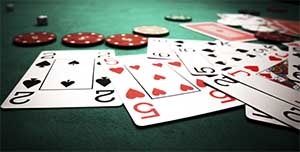 Entering a hand of poker with the strongest hand possible is most likely a great thing, but those times when you have an opposition player chasing a hand and the pot’s building … when out of the blue the fourth diamond pops up and ruins the party. We could rattle through hundreds of different scenarios where a poker player cops a bad beat — it’s just part of playing.
Entering a hand of poker with the strongest hand possible is most likely a great thing, but those times when you have an opposition player chasing a hand and the pot’s building … when out of the blue the fourth diamond pops up and ruins the party. We could rattle through hundreds of different scenarios where a poker player cops a bad beat — it’s just part of playing.
Often though, players can get too invested in gambling pursuits and can’t accept these bad beats and end up chasing losses. This is not smart on so many levels. If you want to be a successful poker player you need to able to ride out the bad beats without compromising your strategy and most importantly your mental state or bank balance. Here are some tips on handling bad beats in poker.
GUIDE: Everything you need to know about poker
1) Avoiding Bad Beats
Step 1: Avoid games where the final card changes things more than you can handle.
Certain types of poker lend themselves to more dramatic final card shifts than others. For example, the final card in Omaha tends to change the trailer to the leader much more often than it does in Hold’em. Omaha hands contain four cards rather than two, a situation that creates more draws for the final card to complete.
In Hold’em, when the board pairs on the end, and you had a straight or a flush going in, you might feel uneasy, but you don’t know for sure that you’re beaten. In Omaha, if the action has been multi-way, anyone who expects a straight to hold up on the end is an optimist. Sets run down straights and flushes far more often in Omaha than in Hold’em (and similarly, people who flop sets get run down by people who make straights and flushes on the end). If you can’t handle that, stay away from Omaha.
Similarly, players correctly hang around more often with hands they are pretty sure are trailing in Seven Card Stud than they do in Hold’em, because it is easier to catch up in stud, where the final card is yours alone, and not shared by you and your opponent.
Step two: Play more pot-limit and no-limit, and less limit poker.
This isn’t a particularly good option for novices, as pot-limit and no-limit require a great deal more skill than limit poker does. It’s also not a particularly good option for American players, because live pot-limit and no-limit games are much more common in Europe than in America.
Nonetheless, if you do have the skill to play pot-limit or no-limit, you will probably find yourself encountering fewer “perceived” bad beats, because you will be able to make bets large enough to protect your hand. In limit poker, if you start out with a very strong hand, someone with a draw might be correct to call you down in an effort to connect on the draw. In pot-limit or no-limit, you can make bets big enough to make drawing at you a financially suicidal play.
Of course, if you do make a bet large enough to protect your hand, and a bad player makes a bad call of the huge bet and gets lucky on the end, your tilt factor will probably triple. But this won’t happen that often, and unless you are very unlucky indeed, this bad player will probably already have contributed heavily to your stack with other such bad calls.
Step three: play within your means
If you are playing in a game whose stakes are borderline too high for your bankroll, you will probably tend to feel more when you suffer a bad beat than if you are playing at a more reasonable stake, because the bad beat hurts much worse, and might conceivably knock you out of action, and leave you unable to get your money back from the bad player who took it. This is particularly true in pot-limit and no-limit games, which is one reason most Americans prefer playing these games in tournaments rather than for cash.
Another variable that leaves players more vulnerable to tilt are the inevitable fluctuations that occur in months or years of playing poker. While I have no doubt whatsoever that long hot and cold streaks are influenced to some degree by fluctuations in how well a player is playing, it is also true that luck runs in cycles of unpredictable lengths.
When you find yourself in the midst of a stretch of bad luck, a stretch where bad beats seem to happen much more frequently, you are much more vulnerable to tilting. Your emotions are tripped more easily and your reduced bankroll makes losing a pot containing X dollars feel like a much greater injustice than had you suffered the same beat when you were feeling more affluent.
Although many players find it difficult to switch to lower-stakes games while “running bad,” you’ll be much less vulnerable to tilting if the stakes are less menacing. You can always move back up again once your emotions, luck, and playing style improve.
Step four: play more tournaments and fewer cash games
For some reason, many players who go on tilt in cash games are able to resist the temptation in tournaments. In part this happens because the player understands they cannot afford the “luxury” of going on tilt in a tournament, where they can’t just reach into a pocket and pull out more chips. You can’t go crazy for a while, keep pulling chips out of your pocket, and eventually get lucky and win them back. In a tournament, once you run out of ammo, you’re out forever, and that fact gives some players discipline they can’t find on their own.
If this sounds familiar, you might try playing ring games using your tournament strategy, or at least your tournament emotions.
2) Dealing with the problem itself
Step one: learn more about poker
The more you learn about poker, the more you realise that good players are going to suffer bad beats more often than bad players, because good players are going to get their money in as favourites much more often than bad players are. At an intellectual level at least, you will expect to suffer more draw-outs than your opponents, because the only way someone can draw out on you is if they got their money in when they were trailing.
Unfortunately, understanding this on an intellectual level often doesn’t help a player deal with it on an emotional level.
Another way that learning more about poker can sometimes help is by allowing you to recognise that in some situations, even though your opponent did get lucky, he didn’t do anything wrong. Sometimes you and your opponent can each do everything correctly, given the amount of information they have available to them, and you just come out on the wrong side of it.
As an example, suppose you hold A-K on the button in Hold’em, raise before the flop, and get called (or even re-raised) by the big blind, who holds Ah-10h. The flop comes A-10-5, and the turn and river fail to change anything. Did your opponent get lucky? Of course. Did your opponent play badly? No. Sometimes recognising that your opponent didn’t do anything wrong takes the sting out of a bad beat, for some players. Of course, these same players are probably more vulnerable to getting unduly upset when they lose to someone who did misplay a hand.
An even more useful skill is realising when you make a mistake in your game which doesn’t overly impact the gameplay. For instance you may have folded a hand when you had the odds in your favour and ultimately this cost you a big pot and a chip lead over a player who was to go on and knock you out with a bad beat. Just analysing the bad beat is foolish and won’t improve your game.
Step two: recognise and take responsibility for the consequences
When poker players go on tilt, they are often indulging themselves and their anger in an almost childish fashion. At some level they understand that going on tilt is much more likely to harm them than to help them, but they want to play ostrich and bury their head in the sand, ignoring the probable consequences, and play in a fashion they would criticise loudly if they observed it in an opponent.
If you keep good records of your poker sessions, not merely of the games you played, the hours you played, and your financial outcome, but also including margin notes about tilt factors and what happened to your chips when you went on tilt, there is a chance, not a great chance, but a chance that you will act a bit less childishly the next time someone puts a bad beat on you, because you will have cold, hard evidence of what indulging your emotions actually cost you.
This can’t hurt your chances of avoiding tilt, but it still probably isn’t that helpful, because at some level, you already know your tilt is hurting you. In the final analysis, the only step you can take that will really help you past this problem is…
Step three: learn more about yourself
While avoiding games that lend themselves to bad beats can reduce your exposure, that’s really just treating and/or masking a symptom, rather than correcting a cause of this deadly poker disease. Learning more about poker falls into the same category. You won’t feel like you’re suffering as many bad beats, because you’ll understand more about why bad beats happen, but you’ll still be vulnerable.
Ultimately, if you are to “master the luck” in poker, you must somehow learn to master your own emotions. Usually that involves quite a lot of soul searching, perhaps done on one’s own, perhaps done with the help of a therapist, or perhaps done with the aid of some sort of Zen teacher. Before you can stop becoming unreasonably and destructively angry when the turn of a card costs you a pot, you will probably need to learn where your anger comes from, and try to face that anger down and let go of as much of it as possible.
This is not likely to be either a simple or a short process, but like most things worth having, the end result is worth working for and waiting for. Not only will you find your poker results improving dramatically, but you will also find answers that will probably help you deal more ably with the mysterious and apparently cruel twists of fate you encounter in real life, where going on tilt can have consequences far worse, and far longer lasting, than losing a few bucks on a river card.



